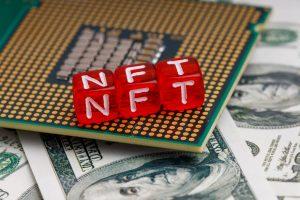Although cryptocurrencies like bitcoin have gone mainstream, non-fungible tokens (NFTs) were relatively unknown until 2021. You may have heard about “Bored Apes” worth tens of thousands of dollars, “CryptoKitties” breeding, or artist Beeple selling an NFT for $69 million through Christies auction house. And what about the billionaire Twitter founder selling his tweet? If you do not exactly understand what an NFT is, you are not alone.
What is an NFT?
Unlike bitcoin or cash, which are fungible or interchangeable, non-fungible tokens are one of a kind. An NFT is a unique digital asset built on a blockchain that comes with the right to use or control it. The digital token cryptographically encodes information related to the asset. An NFT can be a photograph, animation, graphic image, video, meme, tweet, writing or anything that can be stored digitally. NFT ownership is not synonymous with copyright ownership – similar to a collector’s ownership of a real-world painting. When you own a painting, you do not own the underlying copyright. The artist owns the copyright and can make reproductions of the painting. The value of the NFT lies in its uniqueness, which is attributable to its traceability on the blockchain.
What Do You Do with an NFT?
The easiest to understand use of NFTs is when they represent real-world assets or serve as certificates of authenticity. For example, Nike distributing an NFT with every sneaker to protect against counterfeiting. Owning a multi million dollar digitally generated avatar is a bit harder to grasp. But 1 out of 10 Americans invested in NFTs in 2021, so even if the appeal escapes you, the concept of scarcity should be familiar.
What to do if your grandson gifts you an NFT for Christmas or your grandma sends you an NFT as a birthday present? Keep the password safe. NFTs reside in “digital” wallets, which are stored on a computer, flash drive, or an app on your phone. To access an NFT, you must have the private key or seed phrase (at least 12 unrelated words) to the wallet. This private phrase is the only way to retrieve your NFT. The magic words are all that is needed to steal that NFT away.
Taxes, Estate Planning & NFTs
When cryptocurrency is used to buy an NFT there is a taxable event because the bitcoin has a cost basis that may be different than the value at the time it was used to buy the NFT. And cryptocurrency, usually Ethereum, must be used to buy an NFT. In addition to buying an NFT with cryptocurrency, selling an NFT for cryptocurrency, and trading an NFT for an NFT, create taxable events. Profits from the sale of NFTs are considered income and taxed at your ordinary income tax rate. Depending on how long you held the crypto before using it to buy the NFT, you are subject tto either the long term or short term capital gains.
Whether you buy the NFT or it is gifted to you, the basis in the asset is the purchase price. Just like stock or real property, the basis (purchase price) is used to calculate the capital gain or loss for tax purposes when the item is sold. The NFT gets a step up in basis to fair market value at the owner’s death. There are no formal regulations or safeguards in place to track the capital gain – but in the future there likely will be. To get the step up in basis, the NFT must pass through the owner’s estate – this means that your estate planning must take into consideration tax basis planning just like you would with any other appreciated asset.
NFTs (and cryptocurrency) pass like any other asset at death – if you can find them. Unless the private key or phrase is known, there is no way of accessing the assets and gaining ownership. For this reason, we recommend redundancy. Write the phrase down and store it someplace safe, keep it in a password protected file on a computer and flash drive. Since there is no central repository or way to verify ownership of an NFT, we advise clients to make specific bequests of an NFT in their Wills. Calling attention to its existence ensures that the Executor at least knows of its existence. Do not include the pass phrase key of course, since a Will becomes public after probate!
You can also hold an NFT in a Trust. An NFT cannot be retitled in the name of a revocable Trust – but you can transfer the NFT on paper, much like we do with stocks, LLC interests and intellectual property. A revocable trust avoids surrogate’s court and probate. If a client owns a valuable NFT, they may wish to consider moving it out of their estate now – using an irrevocable trust. That way the NFT can grow and the future value will not disrupt your estate plan.
Some practitioners champion holding NFTs in a Limited Liability Company (LLC) because it is easier to transfer LLCs interest than transferring the NFT on the blockchain. However, avoiding recording the transfer on the public ledger defeats the purpose of transparency and authenticity. However, there are other advantages to an LLC to consider, such as transfer tax discounts for lack of control and marketability and asset protection.
The future direction, value, and regulation of NFTs is unknowable. Perhaps one day your Last Will & Testament will be stored on a blockchain and Burner Law Group will hand you over a digital wallet containing your authenticated estate planning documents. For now, just make sure you disclose NFTs and cryptocurrency to your estate planning attorney, so they incorporate them into your estate plan.





